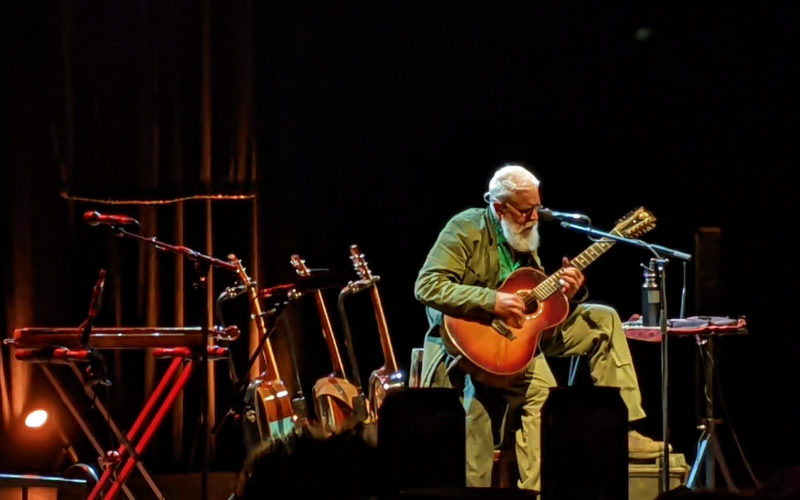Submitted by M.D. Dunn
To celebrate the release of his twenty-seventh studio album, the gorgeous O Sun O Moon, Bruce Cockburn will perform more than forty solo shows this year throughout North America and into the U.K. It is an ambitious schedule for any performer. At seventy-eight, with profound osteoarthritis and a congenital condition that limits his mobility, Cockburn sounds better than ever. His voice is clear and strong with a richer tone and perhaps greater range than in younger days. And his guitar playing, although not as acrobatic as it was forty years ago, is jaw-dropping. Playing the Royal Oak Music Theatre in Royal Oak, Michigan, in mid-June, the Canadian-born California resident demonstrated why he is recognized as one of the most important singer-songwriters and outstanding guitarists of his generation.
The evening began with a set by Dar Williams, who has opened every show on this leg of the tour. Williams is a beloved songwriter. A marvellous storyteller and singer, Williams had the audience in her corner from the start. Having Williams open for Bruce Cockburn is a dream ticket for the folk community. Her stories often begin in the middle of the action, like the continuation of a conversation started long before, and segue artfully into song. A wry wit, both gentle and cutting, underpins it all. It was refreshing to be in the presence of a writer who understands her process well enough to articulate the long, arduous struggle of songwriting. That level of articulate insight into the creation cycle might be expected from the author of the How to Write Songs that Matter (Hachette Books, 2022), based upon the popular songwriting workshops Williams has offered for years. The audience seems to have been there as much for Williams as for Cockburn, cheering and clapping through the introductions to cornerstone songs like “The Babysitter’s Here,” the comical and unsettling account of a child who idealizes her teenaged babysitter, and “When I Was a Boy,” perhaps Williams’ most famous song, about the carefree, undefined days of childhood. Williams’ set was the introductory session in an evening-long masterclass in songwriting and performance.
Bruce Cockburn, in a long coat, arrived on the stage around nine o’clock and was greeted by a din of cheers, applause, and the droning of his first name. Flanked by four guitars, Cockburn sat on a high stool, his left foot resting on a plastic crate. He wasted no time, opening the ceremonies with a rousing version of “The Blues Got the World…” from his 1973 album Night Vision. With stage lights beaming off the chrome-bodied National resonatorlike a searchlight, Cockburn came out laughing, the boisterous crowd giddy over the song’s chorus, “The blues got the world by the balls.”
For nearly two hours, Cockburn demonstrated in song-after-song why his fans love him, and why he is one of the greatest songwriters of our time. It’s hard to believe that all these magnificent songs came from one person. And it was only a small sampling, seventeen songs throughout the night from Cockburn’s catalog. For every song he sang, there are twenty more classics in his backpocket. But it’s the strength of his new material that is most impressive. There are not many artists with a body of work as consistently brilliant as Cockburn’s, and fewer still who can deliver what could well be one of his best albums fifty years after his first release.
After a few songs from his back catalogue, Cockburn was ready to bring the audience to the present day with three from the new album. “On a Roll,” the opening track to O Sun O Moon, is a joyful lament about the strangeness of our current era and the challenge of finding one’s way through unfamiliar conditions: “Time takes it’s toll / But in my soul / I’m on a roll.” He followed this with the odd and delightful“King of the Bolero,” one of Cockburn’s few purely fictious songs, that tells of wandering into a club out of a full-moon night to listen to an otherworldly blues singer. The account is both dreamlike and so detailed that, had Cockburn not revealed it as fiction, we might take it as a first-person account. Next, came the sweet, stunning ballad to long-term love “Push Come to Shove,” with a chorus that both celebrates relationship and mourns the loss of nature:
I could sail what’s left of the seven seas
I could swim with the bears where the ice used to be
I could look in the mirror and blow myself a kiss
But reality calls and it comes down to this:
The place that you hold in my life
Is the axis it all spins around
Push come to shove
It’s all about love
The ring of your laugh is the sweetest of sounds.
In all, Cockburn played seven songs from the new album along with the concert sing-along-standard, his first hit from 1979, “Wondering Where the Lions Are,” and incendiary versions of “If a Tree Falls” and “Stolen Land.” Shouted requests for “If I Had a Rocket Launcher” were ignored. It was clear, the evening was not about vengeance; it was about love, gratitude, transcendence, and the blazing guitar prowess of a true master.
The tour will continue throughout the year. It’s an opportunity to witness a unique artist at the top of his game.
Home page: www.brucecockburn.com
Label: www.truenorthrecords.com
Fan site: www.cockburnproject.net
Fan site: www.brucecockburn.org

